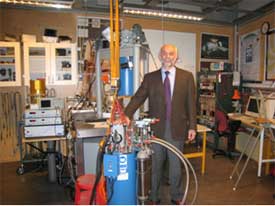Jan 24 2008
Physics research projects that involve ultra low temperatures have a major operational issue to address when competing against non-cryogenic proposals for research funding. This is ultimately due to the rising cost and increasingly unreliable supply of liquid helium, required for the cooling of conventional cryogenic equipment. However, there are now new technologies coming to the market that overcome this hurdle by offering the option of cryogen free measurement environments.
 Prof. Leonid Kuzmin at Chalmers University of Technology, trying out a radical new Cryofree dilution refrigerator
Prof. Leonid Kuzmin at Chalmers University of Technology, trying out a radical new Cryofree dilution refrigerator
Systems based on closed cycle mechanical coolers have developed rapidly, providing the physics community with alternative means of reaching ultra low temperatures. Prof. Leonid Kuzmin at Chalmers University of Technology, Göteborg, Sweden has been trying out a radical new Cryofree® dilution refrigerator from Oxford Instruments, the TritonDR™.
Prof. Kuzmin commented, “We chose the TritonDR for our cryogenic bolometer applications due to the simplicity of its operation. With a regular dilution refrigerator all the pumping, pre-cooling, transferring of liquid helium and nitrogen takes three days of hard work. Instead with the TritonDR, after pumping of the vacuum space, we need to press just two ‘on’ buttons for the compressor and the control unit. The rest is done automatically and we can establish base temperature the following day. As a result postgraduate students can begin their measurements from the very beginning of their studies, without risk to equipment or themselves. In addition, we overcame the so-called ‘cryofobia’ associated with funding applications involving cryogen costs so now we can more easily compete with non-cryogenic research proposals.”
The TritonDR, delivered and installed ahead of schedule to Chalmers University, ran successfully to 35mK. Having a self-contained cryogenic gas cycle, TritonDR is unique when compared to traditional dilution refrigerators. Removing cumbersome pumps and gas handling equipment makes the system simpler to use and reduces the laboratory footprint.
Dawn Brooks, Sales and Marketing Director, also commented, “The TritonDR is a radical new cryogenic technology that has been under development for some time within Oxford Instruments. Bringing this product to market is particularly rewarding for everyone involved as it opens up many new opportunities to perform ultra low temperature science where cryogenics would have traditionally not have been acceptable. Nanotechnology, electrical engineering and materials science are three areas where TritonDR is already addressing the needs of research teams wanting to perform new research enabled by this innovative technology.”